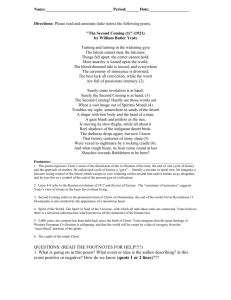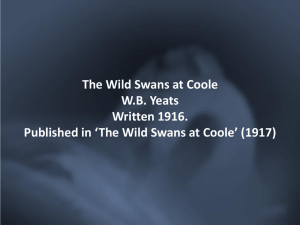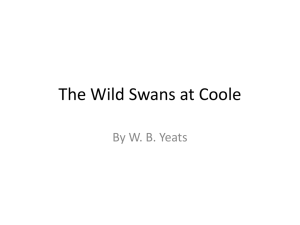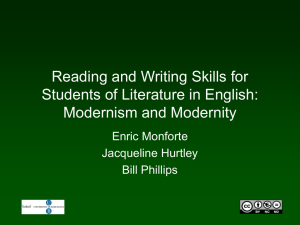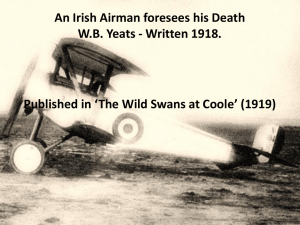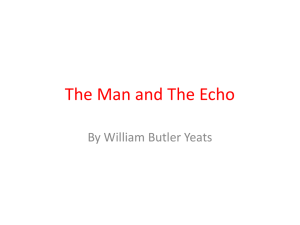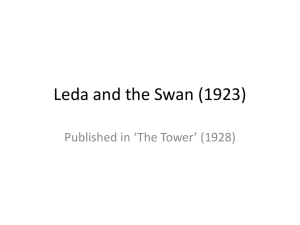Yeats - Bianca Hewes
advertisement
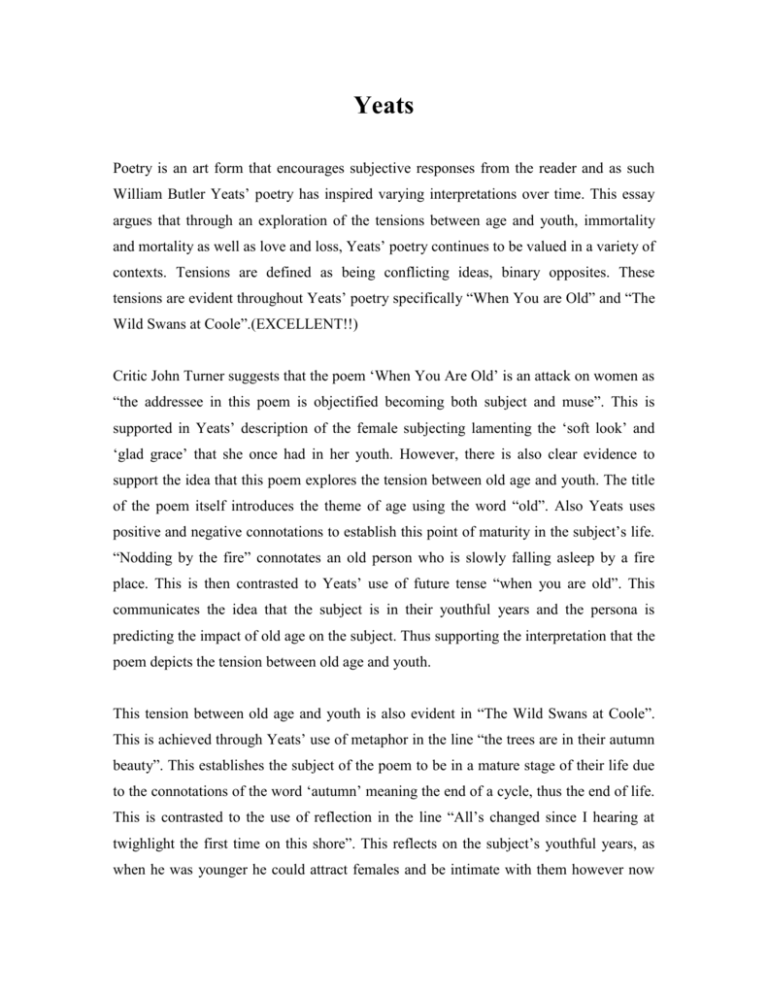
Yeats Poetry is an art form that encourages subjective responses from the reader and as such William Butler Yeats’ poetry has inspired varying interpretations over time. This essay argues that through an exploration of the tensions between age and youth, immortality and mortality as well as love and loss, Yeats’ poetry continues to be valued in a variety of contexts. Tensions are defined as being conflicting ideas, binary opposites. These tensions are evident throughout Yeats’ poetry specifically “When You are Old” and “The Wild Swans at Coole”.(EXCELLENT!!) Critic John Turner suggests that the poem ‘When You Are Old’ is an attack on women as “the addressee in this poem is objectified becoming both subject and muse”. This is supported in Yeats’ description of the female subjecting lamenting the ‘soft look’ and ‘glad grace’ that she once had in her youth. However, there is also clear evidence to support the idea that this poem explores the tension between old age and youth. The title of the poem itself introduces the theme of age using the word “old”. Also Yeats uses positive and negative connotations to establish this point of maturity in the subject’s life. “Nodding by the fire” connotates an old person who is slowly falling asleep by a fire place. This is then contrasted to Yeats’ use of future tense “when you are old”. This communicates the idea that the subject is in their youthful years and the persona is predicting the impact of old age on the subject. Thus supporting the interpretation that the poem depicts the tension between old age and youth. This tension between old age and youth is also evident in “The Wild Swans at Coole”. This is achieved through Yeats’ use of metaphor in the line “the trees are in their autumn beauty”. This establishes the subject of the poem to be in a mature stage of their life due to the connotations of the word ‘autumn’ meaning the end of a cycle, thus the end of life. This is contrasted to the use of reflection in the line “All’s changed since I hearing at twighlight the first time on this shore”. This reflects on the subject’s youthful years, as when he was younger he could attract females and be intimate with them however now he has lost that attraction and abilities. This thus clearly identifies the tension between old age and youth. The line “The woodland paths are dry” has been read as being a metaphor for the persona’s sexual frustration. This is also evident when looking into Yeats’ personal context whereby at the time of writing the poem he was mature in age and believed he could no longer be loved by other women due to his sexual impotence. This particular interpretation introduces the tension between love and loss. The poem ‘When You Are Old’ conveys the tension between love and loss. This poem was written when Yeats was in his 20s and had recently been rejected by his long-time love, Maud Gonne. The emotive language in the poem, specifically in the line “but one man loved the pilgrim soul in you”, reveals Yeats’ heartache over Maud’s inability to recognize the depth of his love and the tension this caused within him. Another example of this is drawn from the use of past tense in the line “how many loved your moments of glad grace”. This is a realization that there once was love felt for this persona but now that love is lost as the weight of time has caused a change of heart. This thus satisfies evidence for the tension between love and loss. The tension between love and loss is also evident in “The Wild Swans at Coole”. This is established through the use of metonymy in the line, “And now my heart is sore”. The heart of the persona is not literally sore but the experience of losing love has left him unhappy, as though he is broken inside. He has become a victim of love so proving this poem thus further explores the tension between love and loss. Also this sense of love and loss is further explored through use of an oxymoron in the line “Unwearied lover by lover, they paddle in the cold companionable streams”. The ‘companionable’ represents warmth created by lovers compared to the ‘cold’ that heart break has left the persona, Yeats, in. Critic Richard Ellman also foregrounds the tensions in these poems in his argument that “Yeats’ poems take one of two directions….visionary, concerned with matters of prophecy…or with their own secret hopes and ambitions”. The tension revealed in his argument is the tension between mortality and immortality. This final tension is the most important for Yeats because it enables him to express his beliefs in the occult and the supernatural. This tension is evident in ‘When You Are Old’ through the use of metaphor. For example the persona of the poem, presumably Maud Gonne, is described to be “nodding by the fire”, this brings to attention the literal meaning of these words but also a second meaning whereby she is falling asleep with the weight of time on her shoulders bringing her down. This is then contrasted to Yeats who “hid his face amid a crowd of stars”. Here Yeats describes how he has become part of the immortal group of artists whose name will live on forever, a reflection of his Neoplatonist belief that the creation of art can secure the artist immortality. The displaying of Maud Gonne aging in a human, mortal, manner whilst Yeats becomes an immortal being, satisfies the exploration of the tension between mortality and immortality. “The Wild Swans at Coole” reveals the persona to be envying the immortality of the swan species as it is recognised that they will remain longer then he will. Yeats uses metaphors to emphasise this evident in the line “their hearts have not grown old”. This line of the poem impresses the immortal nature of these swans as they are still young at heart and suggests that the persona watching is envious of these swans. This is emphasised through the use of alliteration “The bell beat of their wings above my head”. This line can be viewed as religious imagery, with the sounds of bells signifying the ascension of a soul to heaven which is significant in becoming immortal. This image of the swans ascending to the spiritual realm whilst Yeats is staying on earth in a mortal world explores the tension between mortality and immortality. Also this is made evident in the regret felt by Yeats drawn from the last line of the poem “To find they have flown away”. Here it is saying that the swans will fly away to entertain another man with their beauty whilst Yeats remains to pass away being mortal and the swans immortal. Close analysis of Yeats’ poems “When You Are Old” and “The Wild Swans at Coole”, has given ample evidence to lead us to acknowledge how these poems explore different tensions. These tensions each stem from an understanding of Yeats’ context primarily his rejection by Maud Gonne and his quest for immortality. In conclusion, Yeats has achieved immortality as his poems are still valued and studied showing that these tensions are still valued today in this modern society. EXCELLENT!!! DON’T FORGET TO REPHRASE/LINK BACK TO THE ESSAY QUESTION AT THE END OF EACH PARAGRAPH.
